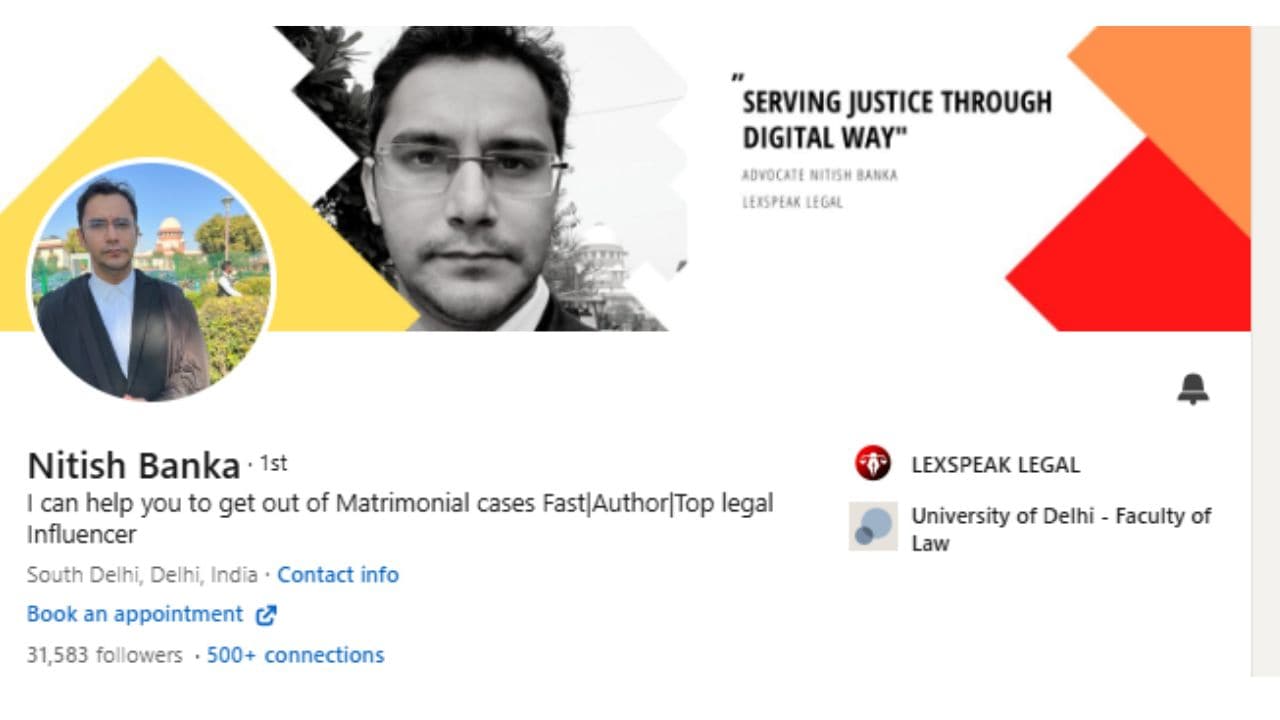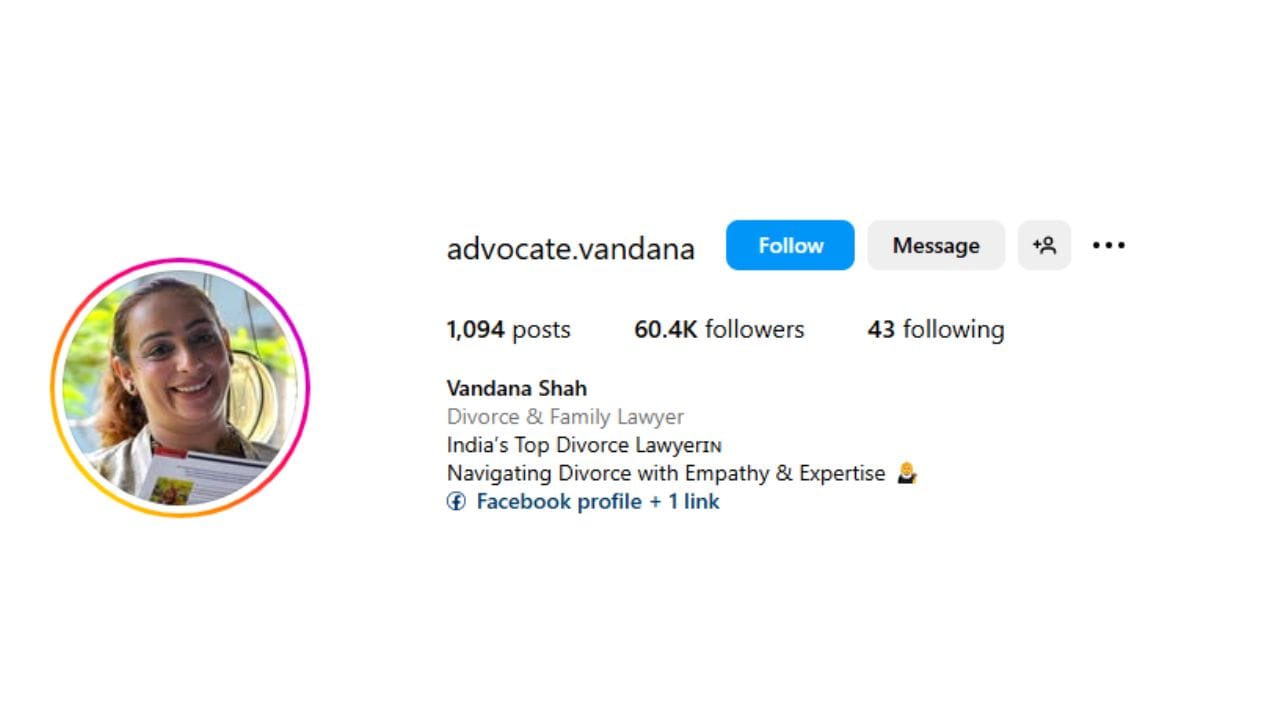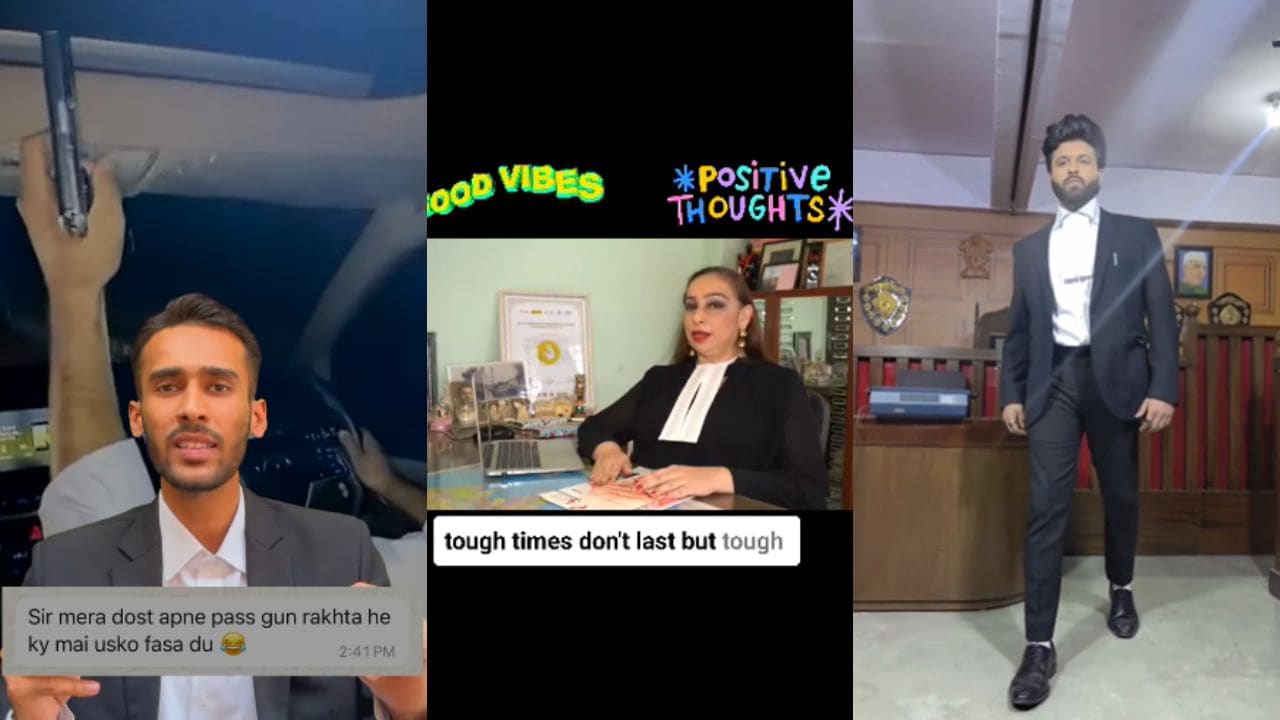“If your friend has a gun and lacks a license. If you file a complaint with the police, or, if the police catch hold of him, an FIR [First Information Report] under Section 25 of the Arms Act will be slapped against him, he is likely to be imprisoned for seven years and face a heavy fine. This reel is important and please share it with your friends who have illegally kept guns with them.”
“Men who have girlfriends. If you are getting into a physical relationship with consent and have not committed to your partners about getting married to them, do send them a WhatsApp message and clear it {with them] that you are getting into this with consent and have no intention of tying the knot. I had a client who faced a similar situation. This is important to avoid complications. If tomorrow, your partner begins to threaten you to marry her or file a complaint against you.”
These reels have been put out by legal influencer Umar Ali, whose Instagram handle goes by @legal.baatein and has followers in excess of 6,33,000.
In the reel on ‘physical relationships’, Ali has not specified any particular legal section. In most of his reels, he is offering legal advice based on the queries that have been addressed to him.
Towards the end of most of his reels, he is requesting to like, share and save them. If one studies his Instagram handle carefully, his bio features “Top Legal Influencer in India”. Majority of the posts on his handle highlight, “WhatsApp at xxx for Legal Advice”, which is a clear indication that he is soliciting work.
Ali is not a qualified advocate registered with the Bar Council of India (BCI). Storyboard18 can authenticate that he is a final year L.L.B. (Bachelor of Laws) student. He does not have the ‘Sanad’ or the license to practice law.
“An advocate has to be enrolled with the BCI to practice law and give legal advice,” said Siddharth Chandrashekhar, advocate & counsel, Bombay High Court (HC).
“While the enthusiasm of final-year LLB students and non-lawyers in contributing to legal discourse is commendable, it raises concerns about the accuracy and reliability of the information shared. Their content might also oversimplify, misinterpret, or overlook critical legal principles, leading to the dissemination of incomplete or incorrect information,” said Amrita S. Nair, advocate, Bombay HC.
She added, “Law is a complex and nuanced field that requires not only academic understanding, but also practical experience and interpretative skills honed over years of practice.”
Advocate Varsha Bhogle, partner, Deshmukh Bhogle Legal Associates, concurred with Nair.
“People, who are dispensing legal advice, ought not do it ‘ideally’ and ‘ethically’. They should use a disclaimer highlighting the fact that they don’t have a license. The audience may receive the said information and take note accordingly,” she said.
Bhogle said, “They should ask advocates to help them draft a disclaimer. If somebody relies on their advice and acts upon it, then the person can be sued or may escape the long arm of the law because of the disclaimer.”
Chandrashekhar agreed. “A disclaimer is the thin line between information and manipulation,” he said.
He added, “Disclaimers also shield creators from potential liability. While not mandated by law, they are essential to maintain ethical standards. Given the rampant misinformation online, disclaimers could serve as a deterrent to unauthorised practice and a safeguard for public trust.”
However, Bhogle explained that Article 19(1)(a) of the Indian constitution, which deals with freedom of speech and expression, Article 19 of the Universal Declaration of Human Rights (UDHR), and Article 19 of the International Covenant on Civil and Political Rights (ICCPR), which says that expression and speech are a person’s international human rights, could play a devil’s advocate.
“Everybody has the freedom of speech and expression, but as a lawyer, one is supposed to have a limited online presence. But ‘limited online presence’ is like a catch-22 situation, because nowadays everything and everyone’s present online. ‘You have to be seen to be known’ is the trend,” Bhogle said.
Nitish Banka, a legal influencer, who is an advocate with the Supreme Court of India (SCI), is seen dispensing legal advice on NBW (non-bailable warrant) in a video shared on his LinkedIn profile, while dressed in Advocate band and gown.

Like Ali’s Insta bio, Banka’s LinkedIn profile mentions, “Top Legal Influencer”, followed by ‘book an appointment’.

The Instagram handle of well-known divorce and family lawyer, Vandana Shah, reads “India’s Top Divorce lawyer”.
When asked about influencers calling themselves ‘Top Lawyers’ or ‘Top Legal Influencers’ in their bios, Chandrasekhar took exception to such bios and said, “the law isn’t a stage for self-proclaimed stars and lawyers ought to exercise restraint from bestowing upon themselves with such titles”
The BCI frowns upon advocates advertising themselves with titles like “Top Divorce Lawyer” or “Top legal influencer”.
The BCI’s Rule 36 explicitly prohibits advocates from engaging in self-promotion or advertisement, whether directly or indirectly.
“The legal profession is a noble one that demands dignity. Such claims dilute its sanctity by turning it into a marketable commodity. By boasting such titles in bios or content, lawyers are engaging in subtle solicitation. These claims not only mislead potential clients and audiences into believing they are performing official legal duties, but also create unhealthy competition, eroding the profession’s decorum,” Chandrasekhar added.
Amish Aggarwala is another example of a legal influencer. He is an “advocate on record” with the apex court, who enjoys a following of 237,000 and his Instagram handle goes by @amish.adv.
In one of his reels, he shared information about the “benefits of becoming an advocate on record’. In this reel, just like Banka, he is seen donning a band and a gown and walking outside the SCI.
In another reel, Aggarwala is seen wearing the advocate’s band while discussing adultery and the spousal rights associated with it. In yet another separate reel, Aggarwala is once again seen in a band and gown amid holding forth on “Can my wife seek any share in my property?”
Most of the thumbnails of the content posted on his Instagram handle depict him in an advocate’s band and gown.
Vikas Sharma, an advocate, whose Instagram handle is @viknagwan, is another legal influencer with a following of over 456,000. In one of the reels, he is seen discussing the “Property of Grandfather”. In another, he is talking about the possibility of the “Appearance in court online?” In both these reels, Sharma has an advocate band around his neck.
Advocate Tarun Chhabra, too, is another legal influencer, who has over 311,000 following on Instagram. He dons an advocate’s band in most of his reels.
In one of the videos on Shah’s Instagram handle, there is an advocate band around her neck where she is seen speaking on embracing positivity and discarding negativity.
Another example of a legal influencer is Ashish Dawar, whose Instagram handle goes by @iamlegalbaba. In one of his reels, the background music is “Pehla Pyaar — DJ JSG”, where the advocate band is seen around his neck. In one instance of the reel, he is seen donning the gown, and the video is ostensibly taken inside a make-believe court.
Read More: Rise of legal influencers and misinformation
Nair explained that the attire of band and gown is traditionally reserved for court appearances and formal legal proceedings. Its usage in promotional content could mislead the public regarding the authenticity and authority of the dispensation of legal advice.
This is also a violation of the BCI’s Rule 49, which mandates that only enrolled advocates are allowed to wear their professional attire, and even then, strictly for courtroom appearances.
Chandrashekhar said, “Influencers wearing these robes while dispensing ‘legal advice’ exploit this symbolism, misleading audiences into believing they are performing official legal duties. Gowns are for the courtroom.”
“While the BCI Rules specify the dress code for advocates in court, they don’t explicitly address the misuse of such attire outside court settings,” Nair added.
(Watch this space for more on ‘The Rise of Legal Influencers in India’)
